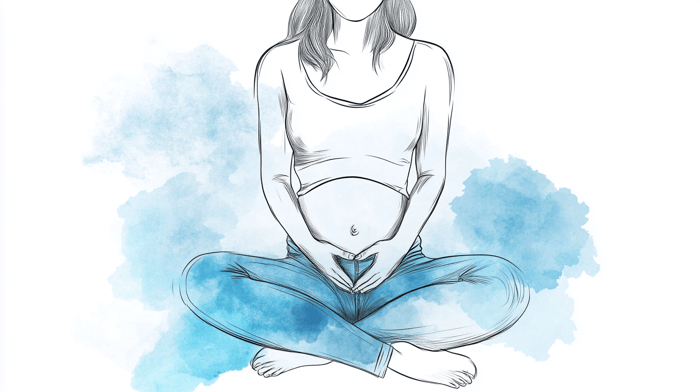Have you recently noticed a strange odor in your vaginal area and wondered if it's related to your pregnancy? Odor or a bad smell can feel uncomfortable to discuss, but it's quite common during pregnancy. Addressing it early on can prevent unnecessary worry.
Your body goes through many changes during pregnancy, and some of them may be surprising. You might expect your body to change physically, but changes like vaginal odor can come as a shock. In this article, we'll discuss what causes vaginal odor during pregnancy, when to see your doctor, and how to manage it.
Strong Vaginal Odor During Pregnancy
Pregnancy brings several changes, and while symptoms like morning sickness, nausea, and back pain are well-known, vaginal discharge and odor are often overlooked. The amount and consistency of vaginal discharge can vary, with many women noticing an increase.
Increased vaginal discharge during pregnancy helps reduce the risk of infections and keeps the cervix moist and healthy. However, if your discharge is foul-smelling, odd in color, or accompanied by itching or irritation, consult your doctor. These may be signs of an infection.
Causes of Vaginal Odor During Pregnancy
Various factors contribute to vaginal odor during pregnancy, including changes in pH balance, infections, hormonal shifts, and diet. If a medical issue doesn't cause the smell, it will likely disappear after giving birth.
Infections
Infections during pregnancy, such as yeast infections or bacterial vaginosis, can lead to unpleasant odors. Yeast infections result in chronic itching and a thick discharge, while bacterial vaginosis produces a foul-smelling, fishy discharge.
pH Level Changes
The normal vaginal pH is slightly acidic, between 3.8 to 4.5. During pregnancy, hormonal changes can alter the pH, making the vagina more susceptible to bacterial infections, which can cause an unpleasant odor.
Hormonal Changes
During pregnancy, estrogen and progesterone levels increase significantly to help support the placenta and nourish the baby. These hormonal shifts can also lead to an increase in vaginal discharge, which may result in a stronger odor.
Dietary Adjustments
Dietary changes during pregnancy can also contribute to changes in vaginal odor. Foods like garlic, broccoli, and spicy dishes can affect the smell of your discharge. Eating probiotic-rich foods like yogurt and kefir can help balance your body’s natural bacteria.
Remedies for Vaginal Odor During Pregnancy
- Keep Your Vagina Clean and Dry: Shower more frequently and clean your vaginal area with lukewarm water. Avoid harsh soaps and use a gentle, doctor-recommended feminine hygiene wash if necessary.
- Refrain From Using Cosmetics: Avoid vaginal wipes, scented sprays, and harsh soaps that can strip away healthy bacteria, leaving you vulnerable to infections.
- Wear Cotton Underwear: Cotton allows your skin to breathe and helps absorb moisture, reducing odor. Change your underwear regularly to stay dry.
- Experiment With Your Diet: A diet rich in fruits, vegetables, and probiotics can help maintain vaginal health. Avoid excess sugars and certain strong-smelling foods like garlic and onions.
- Follow Your Doctor’s Prescription: If your odor is due to an infection, follow your doctor’s prescribed treatment plan, including the use of antibiotics when necessary.
Common Questions About Vaginal Odor During Pregnancy
Is It Normal to Smell Down There While Pregnant?
Yes, vaginal odor is quite common during pregnancy, particularly in the first trimester. While it can be unsettling, mild odor without any color changes in your discharge is usually nothing to worry about. If the odor becomes very strong or fishy, or if the discharge changes color, consult your doctor.
Do You Get a Fishy Smell When Pregnant?
A fishy smell may indicate bacterial vaginosis, an infection caused by an imbalance of bacteria in the vagina. While discharge increases during pregnancy to protect the cervix, any unusual smell, particularly a fishy one, should be checked by your doctor.
When Should I Call the Doctor?
- If the odor persists for an extended period and at-home remedies don’t help.
- If the odor is accompanied by abnormal discharge, itching, redness, or painful urination.
- If you experience any signs of infection, such as irritation or inflammation.
How Can I Get Rid of a Smelly Smell During Pregnancy?
Although you may not be able to prevent all the causes of body odor during pregnancy, you can manage it with a few simple steps:
- Shower daily and use deodorant or antiperspirant.
- Wear loose-fitting, breathable clothing made of natural fibers.
- Use foot powders if necessary to reduce sweating.
- Maintain a balanced diet rich in fruits, vegetables, and water.
Conclusion
While vaginal odor during pregnancy is common, it’s often linked to hormonal changes and will likely subside after giving birth. If you notice a persistent fishy odor, irritation, or unusual discharge, consult your doctor to rule out infections.
By practicing good hygiene, wearing cotton underwear, and maintaining a healthy diet, you can reduce or eliminate vaginal odor during pregnancy. Should you need medical intervention, follow your doctor’s advice for a safe and healthy pregnancy.











